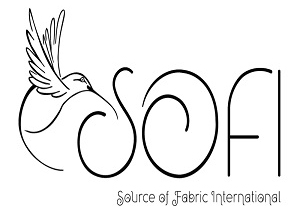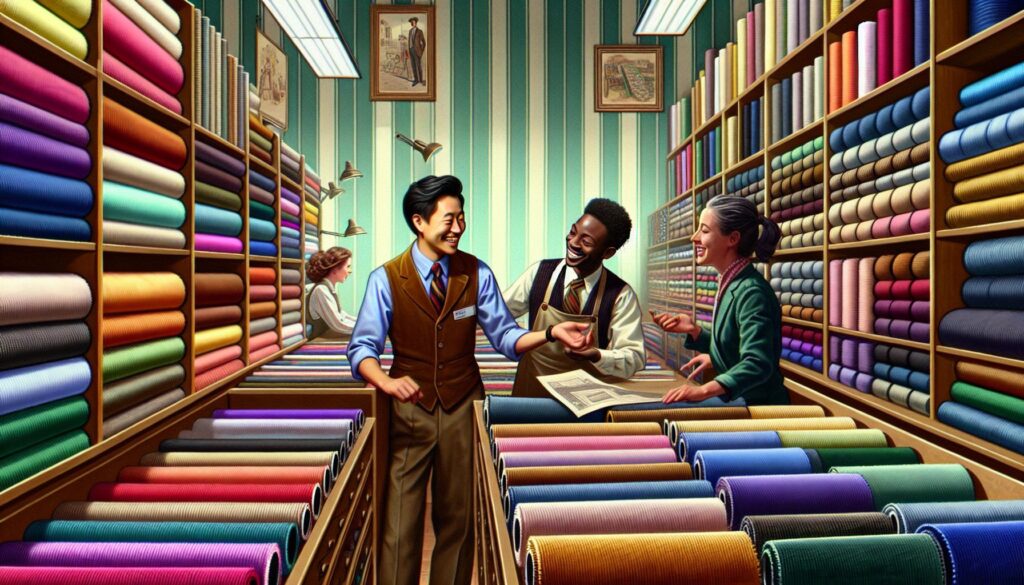Corduroy fabric is making a stylish comeback, and if you’re looking to add this versatile material to your collection, you’re in the right place. Whether you’re sewing a cozy jacket or crafting unique home decor, finding the right corduroy can elevate your project. With its distinct texture and durability, corduroy is perfect for a range of applications, from fashion to upholstery.
Understanding Corduroy Fabric
Corduroy fabric has gained popularity due to its unique texture and adaptability in various projects. This durable material features raised ridges, providing visual interest and a soft feel.
What Is Corduroy Fabric?
Corduroy fabric is a textile defined by its characteristic texture, made up of vertical ribs or wales. Originating in the 18th century, it consists of cotton or cotton blends, which results in a warm and comfortable fabric. Corduroy appears in a variety of weights, from lightweight for shirts to heavyweight for jackets. Its ribbed nature adds dimension, making it a favored choice for both clothing and upholstery. The fabric’s durability makes it highly practical, ensuring items retain their shape and color even after repeated usage or washing.
Different Types of Corduroy
Numerous types of corduroy fabric exist, each serving specific purposes.
- Classic Corduroy: The standard version with pronounced wales. Widely used for trousers and jackets.
- Needlecord: Features finer ribs and a softer touch. Ideal for shirts and children’s clothing.
- Wide-Wale Corduroy: Has broader ribs, creating a bold appearance. Commonly used in upholstery and outerwear.
- Baby Cord: Extra soft and lightweight, perfect for cozy garments like loungewear or baby outfits.
Choosing the right type of corduroy fabric depends on the intended project and desired feel.
Where to Buy Corduroy Fabric
Finding corduroy fabric involves several options, both locally and online. For a hands-on experience, visiting local fabric stores often offers the chance to touch and feel the fabric before purchasing.
Local Fabric Stores
Local fabric stores provide a variety of corduroy options. Stores like Joann Fabrics and Hobby Lobby typically carry various weights and types, including classic corduroy and needlecord. You can check smaller independent fabric shops for unique selections that may not be widely available.
When visiting, look for fabric aisles with clear labels. Stores often categorize fabrics by type, making it easier to find corduroy. Asking staff members for help can expedite your search. They may guide you to specific sections or offer recommendations for popular colors or patterns.
Take advantage of seasonal sales or coupons to save money on your fabric purchases. Many local stores offer frequent promotions, especially during holidays. Calling ahead can confirm if they have corduroy in stock and ensure a successful shopping trip.
Online Retailers
Online shopping offers convenience and accessibility for purchasing corduroy fabric. Numerous websites provide a wide selection, allowing you to find the perfect type for your projects.
Popular Online Fabric Stores
- Joann – Joann offers a variety of corduroy options in different weights and colors. Their user-friendly website allows you to filter by type and price, making it easy to find what you need.
- Fabric.com – Fabric.com features a wide selection of corduroy fabric. The site provides detailed product descriptions, including width and weight, to assist in making the right choice.
- Etsy – Etsy serves as a marketplace for independent sellers. Many shops offer unique corduroy prints that may not be available elsewhere, providing a distinctive selection.
- Sewing.net – Sewing.net specializes in fabric and sewing supplies. They carry a selection of corduroy fabrics, often with discount options for bulk purchases.
- Mood Fabrics – Mood Fabrics, known for its high-quality materials, offers a curated selection of corduroy. Their site provides swatches for better color matching.
Specialty Websites for Corduroy
- Corduroy.com – This site focuses entirely on corduroy fabric. It features various types, from wide-wale to baby cord, catering to specific needs.
- The Fabric Store – The Fabric Store carries a selection of premium corduroy. You can find custom prints and a range of colors suitable for both fashion and home decor projects.
- Timeless Treasures – Timeless Treasures offers unique corduroy prints and textures. Their website includes fabric collection options specifically designed for quilting and crafts.
- Fabric Fairy – Fabric Fairy specializes in children’s fabrics, including playful corduroy patterns. The site often includes sales and specials for budget-friendly options.
- Hawthorne Supply Co. – This website offers an array of corduroy options along with their fabric quality charts. Their website is easy to navigate, ensuring a seamless shopping experience.
Thrift Stores and Secondhand Shops
Thrift stores and secondhand shops offer unique opportunities for finding corduroy fabric. Many of these establishments stock a range of used textiles, some of which may feature high-quality corduroy options.
Benefits of Buying Secondhand
Saving money represents a primary advantage of shopping at thrift stores. Prices typically range from $1 to $5 per yard, compared to $8 to $15 per yard in traditional fabric shops. Eco-friendliness contributes to the appeal as purchasing secondhand helps reduce waste and supports sustainable practices. Unique finds often emerge when browsing secondhand options, as older fabrics may provide distinct patterns or colors not currently available in stores. Local support becomes a factor as shopping at these stores often benefits community initiatives and local charities.
Tips for Finding Corduroy
Visit frequently as new inventory arrives regularly, increasing the chances of discovering corduroy fabric. Ask staff members for assistance; knowledgeable personnel can direct you to specific sections where they store fabric. Check the clothing section since you might find old corduroy garments that can be repurposed into fabric for your projects. Inspect fabric quality carefully to ensure the material is not worn or damaged. Consider the weight of the fabric; heavier corduroy suits upholstery, while lighter options work well for clothing.
Comparing Prices and Quality
Assessing prices and quality is critical for choosing corduroy fabric that fits your needs. Different shops and brands offer various qualities and prices, making comparisons valuable.
How to Assess Quality
Assessing quality involves several key factors. First, inspect the texture. Quality corduroy feels soft yet sturdy. Check for consistent ribs or wales, as uneven patterns may indicate inferior fabric. Second, examine the weight. Heavier weights typically provide better durability, suitable for items like jackets or upholstery. Third, perform a stretch test. Gently pulling on the fabric should show resilience without distortion. Lastly, check for colorfastness. Rinse a small section in water to see if the color fades.
Price Ranges to Expect
Price ranges for corduroy fabric vary significantly based on quality and source. Local fabric stores usually offer prices from $5 to $15 per yard. Specialty shops may charge between $10 and $30 per yard for premium selections. Online stores often provide competitive pricing, typically from $6 to $25 per yard. Thrift stores present the most economical option, with prices averaging $1 to $5 per yard. Seasonal sales and promotions frequently occur, allowing for further savings on purchases. Always compare prices across different sources to find the best option for your project needs.
Tips for Purchasing Corduroy Fabric
Purchasing corduroy fabric involves understanding your project requirements and making informed decisions. Follow these tips to optimize your shopping experience.
How to Know How Much Fabric You Need
Calculate the amount of fabric required for your project by following simple steps. Measure your project dimensions, including length and width. For garments, consider additional fabric for seams and hems. Use a fabric calculator for accuracy or consult the pattern guide if using a commercial pattern.
For example, a basic shirt may require 2 to 3 yards, while a pair of pants typically needs 2 to 5 yards. Add a little extra fabric if you plan to match patterns or want to make adjustments later. Always round up to the nearest yard to avoid running short. When visiting stores, bring your measurements or a list for reference. Having this information on hand ensures you purchase enough material without excess.
Choosing the Right Color and Texture
Select the right color and texture to complement your project aesthetics. Start by considering the purpose of your fabric. For casual clothing, vibrant colors and bold patterns can create unique looks. For home décor items, neutral tones tend to work best for versatility.
Evaluate the texture of various corduroy types. Classic corduroy offers a thicker, more durable feel, making it suitable for outerwear. Needlecord provides a finer texture that works well for lighter garments. Consider how the fabric feels against the skin, especially for items worn close to the body.
Take swatches home if possible. Compare them with other materials in your project to ensure harmony. Check online vendors for color choices and texture options, allowing for greater selection and comparison. Prioritize your project’s vision and choose the combination that meets your needs.
Troubleshooting Common Issues
Finding the perfect corduroy fabric can sometimes present challenges. Here is guidance to address common issues that may arise during your search.
What to Do If You Can’t Find the Right Fabric
Explore local fabric stores, since they often carry a diverse selection of corduroy. Inquire with staff, as they can provide insight into fabric availability or can recommend other locations. Check online stores, many of which offer extensive collections, including specialty shops that may have unique prints. Utilize social media groups, where you can ask fellow crafters for recommendations on where to buy corduroy fabric. Consider custom orders, as some shops might allow you to request specific types or colors not currently in stock. Think outside the box, as sometimes repurposing existing textiles can yield desirable results if you can’t find new fabric.
Alternatives to Corduroy Fabric
Explore denim as a substitute, offering a sturdy feel suitable for various projects. Consider velvet, noted for its softness and luxurious texture, ideal for clothing and home decor. Look into canvas fabric, durable and versatile, perfect for bags or heavy-use items. Think about twill, featuring a diagonal weave that adds structure and visual interest to garments. Evaluate corded fabrics, which share similar texture characteristics while providing different color options. Assess fleece, known for warmth and comfort, fitting for casual clothing or blankets. Investigate cotton blends, which can mimic the softness of corduroy while being widely available at various price points.
Conclusion
Finding the right fabric for your projects can be an exciting journey. With so many options available both in-store and online you’re sure to discover the perfect material that fits your needs. Whether you choose to shop at local fabric stores thrift shops or specialty online retailers each option offers unique advantages.
Take your time to explore different types and weights of corduroy and don’t hesitate to ask for help when needed. By comparing prices and quality you’ll ensure you get the best value for your investment. Remember to enjoy the process and let your creativity shine as you work with this versatile fabric. Happy sewing!
Frequently Asked Questions
What is corduroy fabric?
Corduroy is a textile characterized by its unique vertical ribs or wales, which offer texture and softness. Originally developed in the 18th century, it’s commonly made from cotton or cotton blends and is known for its durability. Corduroy comes in various weights, making it suitable for numerous applications, from clothing to home decor.
What types of corduroy are available?
There are several types of corduroy, each serving different purposes. Classic corduroy has regular width wales, while needlecord features finer ribs. Wide-wale corduroy has broader ribs for a bolder look, and baby cord is lightweight, ideal for delicate projects. Selecting the right type depends on your intended use.
Where can I buy corduroy fabric?
You can purchase corduroy fabric from local fabric stores like Joann Fabrics and Hobby Lobby. Additionally, check smaller independent shops for unique options. Online stores such as Fabric.com, Etsy, and Mood Fabrics offer a wide selection. Seasonal sales can also help you save money on fabric purchases.
Is shopping at thrift stores a good option for corduroy?
Yes, thrift stores can be an excellent source for corduroy fabric. They often sell high-quality textiles at lower prices, typically ranging from $1 to $5 per yard. Shopping secondhand supports sustainability and offers the chance to discover unique patterns or colors that may not be found in stores.
How do I compare prices when buying corduroy?
When shopping for corduroy, assess prices across different sources. Local fabric stores usually charge between $5 to $15 per yard, while specialty shops can range from $10 to $30. Online options typically cost between $6 and $25. Thrift stores provide the most economical choices, averaging $1 to $5 per yard.
What should I consider when purchasing corduroy?
Before buying corduroy fabric, consider your project requirements, including the amount of fabric needed and the desired color and texture. Measure project dimensions and factor in extra for seams. Take swatches home to ensure the fabric aligns with your overall vision and complements the design.
What alternatives exist if I can’t find corduroy?
If you cannot source corduroy, consider alternatives such as denim, velvet, canvas, twill, or cotton blends. Each of these fabrics offers distinct characteristics suitable for various applications, allowing you to complete your project even if corduroy is unavailable.
How can I troubleshoot issues when searching for corduroy?
To troubleshoot, visit local fabric stores and ask staff for recommendations on availability. Check multiple online retailers for extensive options, and explore social media groups for advice. If corduroy isn’t accessible, look for suggested alternatives to suit your project’s needs.


